Related Research Articles
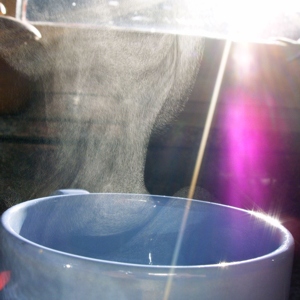
Evaporation is a type of vaporization that occurs on the surface of a liquid as it changes into the gas phase. A high concentration of the evaporating substance in the surrounding gas significantly slows down evaporation, such as when humidity affects rate of evaporation of water. When the molecules of the liquid collide, they transfer energy to each other based on how they collide. When a molecule near the surface absorbs enough energy to overcome the vapor pressure, it will escape and enter the surrounding air as a gas. When evaporation occurs, the energy removed from the vaporized liquid will reduce the temperature of the liquid, resulting in evaporative cooling.
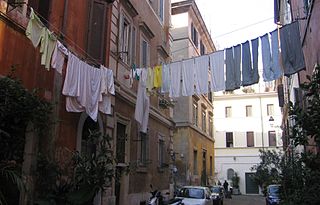
Laundry is the washing of clothing and other textiles, and, more broadly, their drying and ironing as well. Laundry has been part of history since humans began to wear clothes, so the methods by which different cultures have dealt with this universal human need are of interest to several branches of scholarship.

A washing machine is a machine designed to launder clothing. Modern-day home appliances use electric power to automatically clean clothes. The term is mostly applied to machines that use water as opposed to dry cleaning or ultrasonic cleaners. The user adds laundry detergent, which is sold in liquid, powder, or dehydrated sheet form, to the wash water.

A clothes dryer is a powered household appliance that is used to remove moisture from a load of clothing, bedding and other textiles, usually after they are washed in the washing machine.

A laundry room or utility room is a room where clothes are washed, and sometimes also dried. In a modern home, laundry rooms are often equipped with an automatic washing machine and clothes dryer, and often a large basin, called a laundry tub, for hand-washing of delicate clothing articles such as sweaters, as well as an ironing board. Laundry rooms may also include storage cabinets, countertops for folding clothes, and, space permitting, a small sewing machine.

A clothes line, also spelled clothesline, also known as a washing line, is a device for hanging clothes on for the purpose of drying or airing out the articles. It is made of any type of rope, cord, or twine that has been stretched between two points, outdoors or indoors, above ground level. Clothing that has recently been washed is hung over the line to dry, held in place using clothes pegs or clothespins. Washing lines are attached either from a post or a wall, and are frequently located in back gardens, or on balconies. Longer washing lines often have props holding up the mid-section so the weight of the clothing does not pull the clothesline down to the ground.

A mangle is a mechanical laundry aid consisting of two rollers in a sturdy frame, connected by cogs and powered by a hand crank or by electricity. Mangles are used to press or flatten sheets, tablecloths, kitchen towels, or clothing and other laundry. The "wringer", a smaller lighter machine of similar appearance and function, was used to squeeze the water out of wet washing. While mangles remain in use in commercial settings, wringers have been made redundant by the spin dry cycle on modern washing machines.
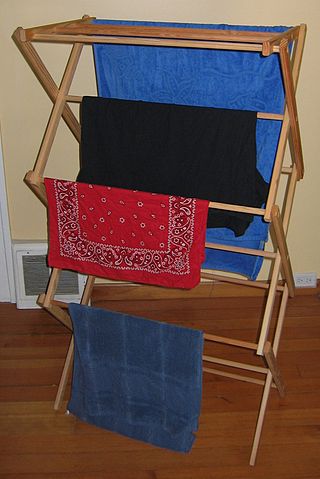
The term "clothes horse" is used to refer to a portable frame upon which wet laundry is hung to dry by evaporation. The frame is usually made of wood, metal or plastic. It is a cheap low-tech piece of laundry equipment, as opposed to a clothes dryer, which requires electricity to operate, or a Hills Hoist, which requires ample space, wind and fine weather. It also served as an alternative to an airing cupboard. In cold, damp seasons and in the absence of central heating, a clothes horse placed by a fireside or a kitchen range provides a place to warm clothing before putting it on. The practice of airing, once ubiquitous in Great Britain, for example, in the constant battle against damp and mold, has become far less common with the advent of central heating and affordable clothes dryers.

Persil Service was the trading name of Persil Services Ltd., which operated concession units within selected Sainsbury's stores in the United Kingdom. The company operated over 70 shops and employed staff who were trained to process photographs, prepare dry cleaning and laundry, cut house keys and to serve customers.

A combo washer dryer is a combination in a single cabinet of a washing machine and a clothes dryer. It should not be confused with a "stackable" combination of a separate washing machine and a separate clothes dryer.

A self-service laundry, coin laundry, or coin wash, is a facility where clothes are washed and dried without much personalized professional help. They are known in the United Kingdom as launderettes or laundrettes, and in the United States, Canada, Australia and New Zealand as laundromats. In Texas and other parts of the south central United States, the term washateria is still used by some older speakers. The first laundromat opened on April 18, 1934 in Fort Worth, Texas.

A drying cabinet is today usually an electrical machine designed to expedite the drying of items - usually clothing - that are unsuitable for a mechanical clothes dryer. Such items may include delicate clothing care labeled as "hang dry", "dry flat" or "do not tumble dry" on their wash instructions, as well as items such as comforters, boots and coats.
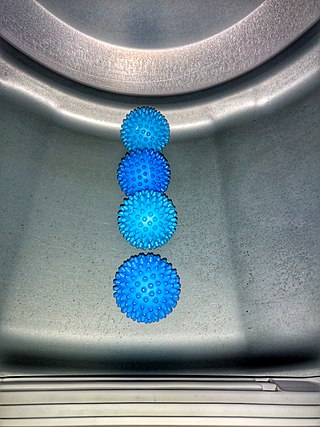
A dryer ball is a spherical laundry device for tumbling clothes dryers used as an alternative to fabric softener, reducing static electricity or softening clothing, or to accelerate the drying process.

An overhead clothes airer, also known variously as a ceiling clothes airer, laundry airer, pulley airer, laundry rack, or laundry pulley, is a ceiling-mounted mechanism to dry clothes. It is also known as, in the North of England, a creel and in Scotland, a pulley.
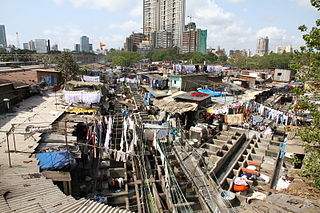
Dhobi Ghat is an open air laundry in Mumbai, India. It was constructed in 1890. The washers, known as dhobis, work in the open to clean clothes and linens from Mumbai's hotels and hospitals.
The Laundry Workers Industrial Union was a labor union affiliated with the Communist Party's Trade Union Unity League during the early 1930s. Established in 1931, the union organized laundry workers in New York City, and later became part of the non-Communist Amalgamated Clothing Workers of America. The union's membership was primarily African American and Afro-Caribbean women.
Laundroid was a laundry-folding machine and home robot, used to automatically wash, dry, iron, sort and fold clothes to a dedicated closet. It was dubbed to be the world's first laundry folding robot, and was planned to go on sale in Japan first, and subsequently, in a limited number, in the United States. Release date was set to 2017, with pre-orders starting in March 2017.
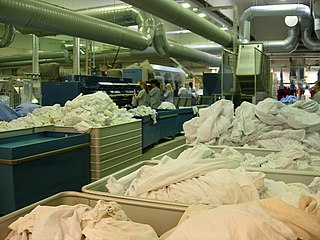
A laundry-folding machine or laundry-folding robot is a machine or domestic robot which folds apparel such that they can be stored compactly and orderly.
Poplin is an American company which allows people to hire independent contractors to wash, dry, fold, and deliver laundry. SudShare was co-founded in 2018 by Mort and Nachshon Fertel in Baltimore, Maryland, and operates through a mobile app of the same name. The service is available in over 400 American cities.